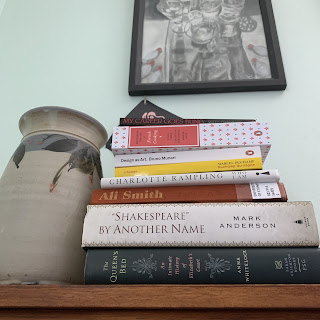Echoes and echoes and echoes and
Dear Void,
I’m warming up, like a microwave dinner, my aspiration to write a post every day (I heard you Seth Godin: get 'em out there!).
I’m thinking about the ways my subject had borrowed, translated and adapted the text of others and prior text. She did that almost as a methodology. When I first started I had an inkling that she did—making marvellous new work in the process—but it’s only now that it’s all revealing itself clearly to me. I may be delirious cos it’s the end of the day, but clarity is what I’m getting a hint of. I like it.
Today I unpacked my thesis (again). I ripped into some paragraphs that I’d written in order to flesh them out more. My methodology. ‘Subsuming reading into a composite site of …’ I won’t go on since I might be accused of plagiarising myself when this goes online and I hand in my thingo.
But it (today) was all about poetical
echoes. John Hollander, in his book The Figure of Echo, says that ‘poems
seem to echo prior ones for the personal aural benefit of the poet, and of
whichever poetic followers can overhear the reverberations.’[i]
^^^
Reflection on thesis management and administration >>>(I wanted to practice using Endnote’s CWYW [Cite While Your Write] feature but that’s when I realised I didn’t have the reference I wanted. So, I went to our library catalogue, searched for the record, downloaded the RIS, et voila! Citation-ability! However, I can’t find a way that allows me to add page numbers, I thought I had yesterday. So, glitchy.)
 |
| 16:42 Thursday. On my desk. Oh, no! It's always this organised! |
My thought for the day is: It’s impossible to be so superconscious of what you are doing when you write that you might as well freeform and then rewrite iteratively later. By ‘later’ I mean like at the end of the day or at the end of a short period of time, so you’re still in touch with the initial impulse but with a little distance to be able to form, smoosh and shape the text into something that truly comes from your own thinking.
In 2019, when I began this doctorate, I went back to visit some material that I used as I worked on Lady Mary’s commonplace. And I saw, then, that I think I stole from her a line that I really thought was my own. I think now I was probably responding to hers, and I wish I’d written down that process.
Anyway, here’s Lady Mary’s line (from her delicious poem ‘This once was me’):
'Tis said, the Gods by ardent Vows are gain'd,
Iphis her wish (however wild) obtain'd,
Pygmalion warm'd to Life his Ivory maid,
Will no kind power restore my charms decai'd?
And here’s mine:
as pygmalion warms his wretch [to life] like a microwave dinner
a homily so adamant to strut a peacock strut, made pulp
pressingly set a broad frame of reference — gilt —
I took her personal to make my impersonal. An assembly of wretches, we.
Thanks for listening, Void.
Jx
[i] Hollander, John. The Figure of Echo :
A Mode of Allusion in Milton and After. University of California Press,
1981.


Comments
Post a Comment